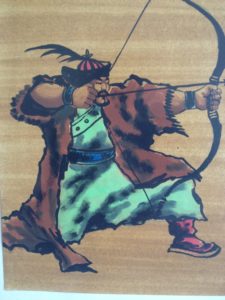Were the good old days better? Were ancient cultures pure of malicious motives? Were those cultures never rude or cruel or greedy? One phenomenon in the study of culture is the sense that “culture or society is DETERIORIATING.” You’ve heard this type of comment from older folks, haven’t you?
What was once normal and good, is left along the way for greed, selfishness, and lack of respect. Who hasn’t noticed that respect due to the ELDERS is one of the first things to fall by the wayside as western, modern culture pervades a place. Youth do not give up their seats to the grandmothers on the bus. Grown children do not readily take the parents or grandparents into their home to care for them in their feeble days. They used to.
In the work of Zitkala-Ša called American Indian Stories, she tells the story of THE WIDESPREAD ENIGMA CONCERNING STAR WOMAN. We learn of Chief High Flier who appeals to Washington that the BLUE-STAR WOMAN is obtaining Indian lands by trickery or deceit. Two youths of his tribe turned “rogue” against their people. He writes the letter sets out for the post office. Listen to how Zitkala-Ša describes the old man’s thoughts…
The old chieftain came out, carrying in one hand his long-stemmed pipe and tobacco pouch. His blanket was loosely girdled about his waist. Tightly holding the saddle horn, he placed a moccasined foot carefully into the stirrup and pulled himself up awkwardly into the saddle, muttering to himself, “Alas, I can no more leap into my saddle. I now must crawl about in my helplessness.” He was past eighty years of age, and no longer agile.
He set upon his ten-mile trip to the only post office for hundreds of miles around. In his shirt pocket, he carried the letter destined, in due season, to reach the heart of American people. His pony, grown old in service, jogged along the dusty road. Memories of other days thronged the wayside, and for the lonely rider transformed all the country. Those days were gone when the Indian youths were taught to be truthful, –to be merciful to the poor. Those days were gone when moral cleanliness as a chief virtue; when public feasts were given in honor of the virtuous girls and young men of the tribe. Untold mischief is now possible through these broken ancient laws. The younger generation were not being properly trained in the high virtues. A slowly starving race was growing mad, and the pitifully weak sold their lands for a pot of porridge.
The story does not end well. Chief High Flier is taken in by authorities one mile short of the post office. He is condemned –falsely– as one who has set fire to government buildings.
As readers, we are left with the lingering thought that this story has layers and layers of meaning. The story is actually an allegory or sorts. Washington is the U.S. Government, the two youths are the younger generation, the old chieftain is the ancient Sioux who lived closer to their original ways and days, who remember HOW IT USED TO BE.



